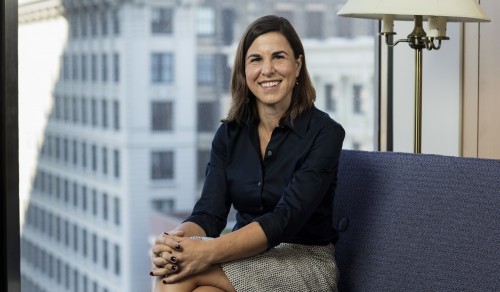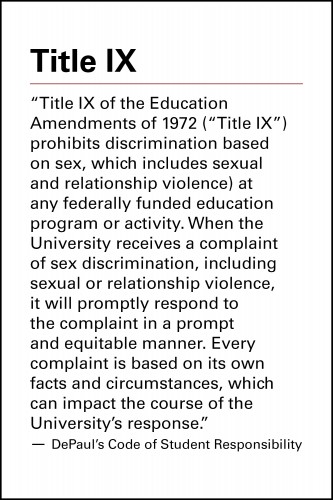
Since officially starting in her new role on Sept. 8, Karen Tamburro has yet to experience what she would call “a typical day.” After all, Tamburro is getting used to a position that’s been deemed so important that it’s now a full time job.
Tamburro is DePaul’s new Title IX coordinator, the person responsible for complying with Title IX, the federal law that prohibits sex discrimination in all the operations of colleges and universities. This includes tacking complaints based on cases of sexual violence, sexual harassment and sexual discrimination.
In an effort to shift DePaul’s sexual assault reporting process and other dealings with gender discrimination, changes were recommended from the university’s Sexual Violence Prevention and Response Working Group.
Their message was clear: DePaul’s Title IX coordinator should be an independent position rather than a role held by the Dean of Students.
And so after a three-month search, Tamaburro, who graduated from DePaul’s Law School in 1996, was hired after 14 years as a supervisor attorney with the Department of Education’s Office for Civil Rights (OCR) where she worked with Title IX on a daily basis.
Now, Tamburro is responsible for evaluating DePaul’s policies and procedures of the reporting process and the processes in place to responding to complaints of sexual assault, harassment and other gender discrimination.
She has 90 days to report her findings and recommend changes.
“With respect to the reporting process and the processes in place in responding to complaints of sexual assault, harassment and other gender decimation, I’m looking at the policies and procedures,” Tamburro said. “That’s part of what I’ve been doing for the last two and a half weeks. I’ve been looking at them to fully understand them, to ensure they are clear and readily available. And also to understand how they’ve been implemented.
“I’m two and a half weeks in and want to get it right,” Tamburro said.
Getting “it” right is something that Elizabeth Ortiz, DePaul’s Vice President for the Office of Institutional Diversity and Equity, also stressed. Ortiz was not only tasked with finding an independent Title IX coordinator, but her office will also oversee the process with Tamburro reporting to her.
[quote]I want to be the model school that people look at who gets it right. We have to get it right for our students.” — Elizabeth Ortiz, DePaul’s Vice President for the Office of Institutional Diversity and Equity[/quote]
Ortiz said the position being in her office “was a perfect fit.”
“If you ask me what is this program going to look like, well we’re going to follow it to the letter of the law,” Ortiz said. “But I hope we go beyond that. Right now, Karen is assessing where we are, what we need to do and what the best practices are. And how we can expand it, not only with one issue (sexual assault) but beyond. We have a lot of work to do.”
“When I hired her, I said ‘I don’t want to be just good at this,’” Ortiz said. “I want DePaul to be the best. I want to be the model school that people look at who gets it right. We have to get it right for our students.”
Ortiz said that changes being looked at involved their data management systems, DePaul’s investigative procedures and even the judicial process. She said it needed to be taken care of in bite-sized chunks of policy.
If there’s an area that Tamburro won’t have to get acquainted with, it’s being well-versed with the federal law of Title IX. At OCR, Tamburro said she was in constant communication with other universities to make sure they were abiding by the law as well as handling a number of complaints, including stories of sexual assault.
 Tamburro is also familiar with the notion that a Title IX coordinator should be regarded as independent. Her former employer distributed a “Dear Colleague” letter in April, suggesting that “designating a full-time Title IX coordinator will minimize the risk of a conflict of interest and in many cases ensure sufficient time is available to perform all the role’s responsibilities.”
Tamburro is also familiar with the notion that a Title IX coordinator should be regarded as independent. Her former employer distributed a “Dear Colleague” letter in April, suggesting that “designating a full-time Title IX coordinator will minimize the risk of a conflict of interest and in many cases ensure sufficient time is available to perform all the role’s responsibilities.”
“It’s an independent set of eyes to ensure that no acts of incrimination based on sex are occurring,” Tamburro said. “This is my sole focus. I don’t have any other interests tugging me away from that issue. I can concentrate on that fully.”
Tamburro takes over the role of Title IX coordinator from Ashley Knight, who will remain the Dean of Students. Knight said she was also a proponent of moving the position.
“It ensures the university’s process has an institution-wide focus, is applied consistently across all areas of the university and complies with federal legislation,” Knight said in an email. “Karen’s hire is good for DePaul, and I am very pleased to welcome her to a university where I’ve been saying everywhere and often ‘sexual violence prevention is everyone’s business.’”
The role has also expanded with Tamburro now having five deputy coordinators: Student Affairs, Athletics, Human Resources, Enrollment Management and Marketing and Academic Affairs. Ortiz said they will act as Tamburro’s “response arm” to mobilize accommodation for students and help them faster.
The one adjustment, however, Tamburro will have to make is getting to work in a university setting. She said she’s already been meeting with faculty, giving trainings in how to report cases and deal with them. She also is eager to meet with students, planning to meet wit the Student Government Association in October and added that any student is free to meet with her anytime in either of her two offices, located in the Student Center in Lincoln Park and one in 14. E. Jackson.
Ortiz said she’s confident that Tamburro’s experience with civil rights will translate into helping students. She stressed that they’re only as good as the feedback they hear from students.
Ira Lowy, a senior who is involved with Feminist Front, is one student who has been heavily involved with protesting sexual assault awareness on campus. Lowy was involved in the annual Take Back the Night protest as well as Carry that Weight, both efforts to increase knowledge and change the stigma towards rape culture.
“It always beneficial for students to have contentious to have the ability to act independently,” Lowy said. “But I know DePaul has had limited amount of Title IX problems in the past. I wouldn’t see Title IX as our biggest issue in the past. What I see as our issue is the punitive issues against people who commit sexual assault and the culture overall about sexual assault and sexual health on campus.
“I don’t think this would have happened if there wasn’t a national outcry or the student voice.”
Perhaps there was no greater feedback for Ortiz than reading about the case of Meagan Anderson, a DePaul student who said she was raped off-campus after a party and then took issue with the way DePaul handled the conduct hearing process when she filed a complaint. The accused was found guilty of violating the sexual and relationship violence policy in DePaul’s code of conduct, but was only suspended two quarters.
Ortiz said she couldn’t comment specifically about Anderson’s case, but the impact from the story was there.
“Whenever someone in our community suffers, we all suffer. It goes to the heart to who we are and what we believe,” Ortiz said. “You feel deeply for this young woman. She said she felt robbed of her own body…” Ortiz paused and tears started to form around her eyes.
“But that’s pretty traumatizing. I do think that’s why this issue is such urgency and so important. We don’t want anyone to hurt that way … But that’s why we have to be the best. Our obligation is so high.”
“To me, it’s a tremendous responsibility,” Ortiz said. “Now we have to find the best way to address it and remedy it.”

